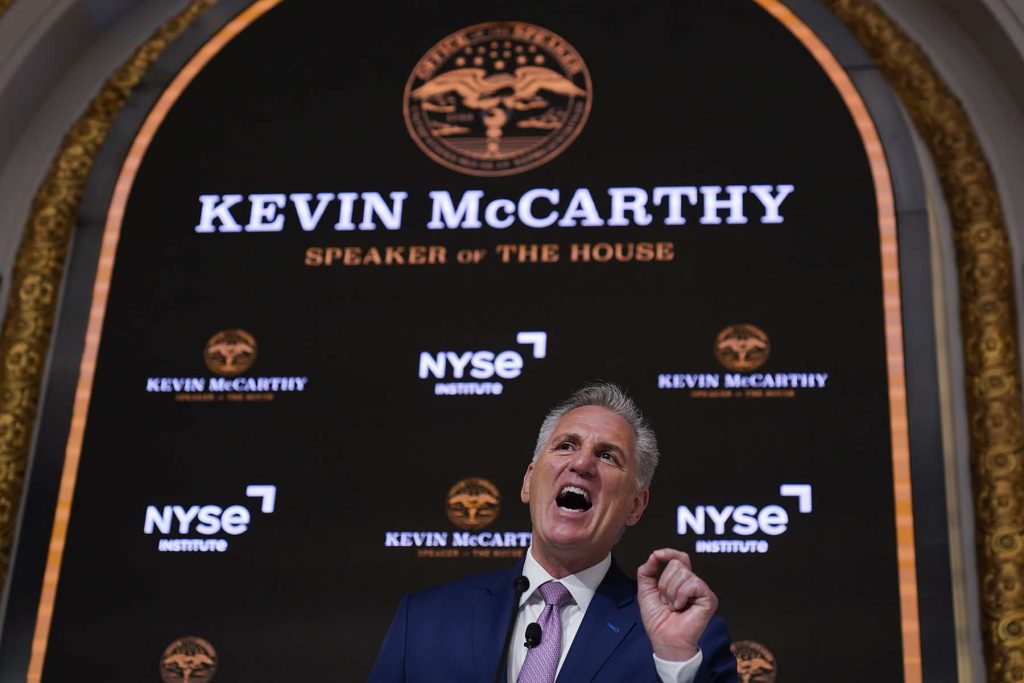May 5, 2023 | U.S. Government Risks a Damaging Default on its Debt

The looming fight over a statutory limit on borrowing by the U.S. federal government is getting close to a red alert situation.
If the disagreement is not resolved the government will run out of money to spend.
Could the government default on its payments? What would the consequences be?

Source: Milwaukee Independent
At the most basic level this conflict is much ado about nothing, because the U.S. government will remain a creditworthy borrower, for the foreseeable future.
But the drama over the breach of the statutory debt limit could cause some serious damage, as happened in 2011. At that time President Obama was President and Republicans controlled Congress. Republicans wanted the Obama government to agree to spending cuts in exchange for an agreement to increase the debt ceiling.
An agreement was eventually reached after the Democrats made concessions, but the Dow Jones index dropped by 2,000 points — a decline of about 16 percent. An equivalent decline today would be 5,000 points!
In the summer of 2011, clients were phoning to ask if we should get out of the U.S. market. We convinced them to stay and two years later the market was up 25 percent.
If the government couldn’t pay its bills the effect on the economy would be widespread and serious. Even in the most “free enterprise” country on the planet the government is a significant spender and employer, second only to the consumer.
So, why is there a crisis now?
The issue started with a 1917 law — the Second Liberty Bond Act — that forbid the U.S. Treasury to borrow more money than the limit imposed by Congress. During the 106 years since then this limit has increased an estimated 90 times. Debts continue to rise. Usually, the limit is changed without much conflict.
This time the debate seems more heated, with both sides digging in their heels. The government reached the current debt ceiling of $31.4 trillion in January but has used special measures to extend payments. But that wriggle room has just about expired.
And, in a game of chicken, the winner is often the one who holds out the longest. Republicans “won” in 2011 when Obama backed down. But today Republican demands leave less room for compromise and Democrats control the House. So, a stalemate with payment defaults seems inevitable.
Bloomberg columnist Bill Dudley, a former Federal Reserve governor and chief economist for Goldman Sachs says, “a full-on collision is entirely possible…The Democrats favor increasing taxes on the wealthy…The Republicans favor sharply cutting domestic spending.”
Dudley goes on, talking about a default, “…The damage would be vast. Markets — still dealing with the consequences of a rash of bank failures — would be shocked, having expected the usual last-minute deal. Stock and bond prices would decline violently.”
Dudley is using hyperbole, in an attempt to influence members of Congress, but his points are valid.
However, even if a “full-on collision” happens this summer, by 2024 the crisis will be forgotten, and other issues will create new drama.
Hilliard MacBeth
The opinions expressed in this report are the opinions of the author and readers should not assume they reflect the opinions or recommendations of Richardson Wealth or its affiliates. Assumptions, opinions and estimates constitute the author’s judgment as of the date of this material and are subject to change without notice. We do not warrant the completeness or accuracy of this material, and it should not be relied upon as such. Before acting on any recommendation, you should consider whether it is suitable for your particular circumstances and, if necessary, seek professional advice. Past performance is not indicative of future results. The comments contained herein are general in nature and are not intended to be, nor should be construed to be, legal or tax advice to any particular individual. Accordingly, individuals should consult their own legal or tax advisors for advice with respect to the tax consequences to them, having regard to their own particular circumstances.. Richardson Wealth is a member of Canadian Investor Protection Fund. Richardson Wealth is a trademark by its respective owners used under license by Richardson Wealth.
STAY INFORMED! Receive our Weekly Recap of thought provoking articles, podcasts, and radio delivered to your inbox for FREE! Sign up here for the HoweStreet.com Weekly Recap.
Hilliard MacBeth May 5th, 2023
Posted In: Hilliard's Weekend Notebook
Next: The Silver Institute »











